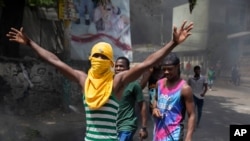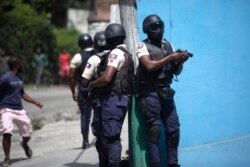More than a dozen people have been detained in the assassination of Haitian President Jovenel Moise, officials said late Thursday.
Haitian authorities described a heavily armed hit squad of 28 "mercenaries,” made up of 26 Colombians and two Haitian Americans, involved in the killing of Moise, 53, at his private residence in a wealthy suburb of the capital, Port-au-Prince, before dawn on Wednesday.
Haiti National Police Director Leon Charles said Thursday that 17 men had been detained, the two American citizens and 15 Colombians.
Charles said that three suspects had been killed and eight were still at large. Earlier, police had said four suspects had been killed. Neither Charles nor police officials explained the discrepancy.
"The pursuit of the mercenaries continues," Charles said. "Their fate is fixed: They will fall in the fighting or will be arrested."
Early Friday, Taiwan released a statement saying that 11 suspects were caught on the grounds of the embassy in Port-au-Prince after attempting to flee police.
"The police launched an operation around 4:00 p.m. (Thursday) and managed to arrest 11 suspects," the Taiwanese Embassy statement said.
Mathias Pierre, Haiti's minister of elections, Thursday identified the two Haitian Americans as James Solages, 35, and Joseph Vincent, 55.
The U.S. State Department has not confirmed the reports that two U.S. citizens are in detention.
Late Thursday, Colombia’s government confirmed that at least six of the suspects, including two of those killed, appeared to be retired members of the Colombian army. It did not identify the suspects.
Interim Prime Minister Claude Joseph placed the country under a "state of siege" — in effect, martial law.
"This death will not go unpunished," Joseph told the impoverished nation of 11 million people in an address Wednesday.
Brian Concannon, a human rights lawyer, a former United Nations human rights officer, and the founder of the Institute for Justice and Democracy in Haiti, told VOA that the state of siege allows police to do "anything necessary" in pursuit of the killers.
"Although almost everybody wants the police to pursue the killers effectively, there's great concern that this can be abused to round up political opponents," he said.
"There really is nothing — no structures to stop the government from arresting its political opponents under this decree."
Officials did not provide much further detail about the detained suspects, those killed in the gun battle or what led police to them. They said only that the attack was carried out by "a highly trained and heavily armed group," with the assailants speaking Spanish or English.
The motivation for the assassination remains unclear. Haiti has long endured poverty and political turmoil, however.
Carl Henry Destin, a Haitian judge, told Le Nouvelliste newspaper that the attackers had posed as agents of the U.S. Drug Enforcement Administration, but both U.S. and Haitian officials said the gunmen had no links to the agency.
Destin told the newspaper the attackers tied up a maid and another household staff worker as they headed to the president's bedroom, where they shot Moise at least 12 times.
"The offices and the president's bedroom were ransacked," Destin said. "We found him lying on his back, blue pants, white shirt stained with blood, mouth open, left eye blown out."
Moise's wife, Martine Moise, was injured in the attack and airlifted more than 1,100 kilometers to a trauma center in Miami, Florida, in the United States. Joseph, the prime minister, said she was "out of danger" and in stable condition.
While Joseph claimed leadership of Haiti, which shares the Caribbean island of Hispaniola with the Dominican Republic, his tenure may be short-lived.
Haiti's constitution says Moise should be replaced by the president of the country's Supreme Court, but the chief justice died recently from COVID-19. In addition, a day before his assassination, Moise had named Ariel Henry, a Haitian politician and neurosurgeon, to replace Joseph as prime minister.
In a brief interview with The Associated Press, Henry claimed he was the prime minister, but he acknowledged it was an unusual situation.
The United Nations Security Council called an emergency meeting for Thursday afternoon to discuss Haiti's crisis. In a statement, its members called for "all parties to remain calm, exercise restraint" and avoid "any act that could contribute to further instability."
U.S. President Joe Biden said he was "shocked and saddened" by the assassination.
"We condemn this heinous act," Biden said in a statement. "I am sending my sincere wishes for first lady Moise's recovery."
State Department correspondent Cindy Saine contributed to this report, which includes some information from The Associated Press, Agence France-Presse and Reuters.






